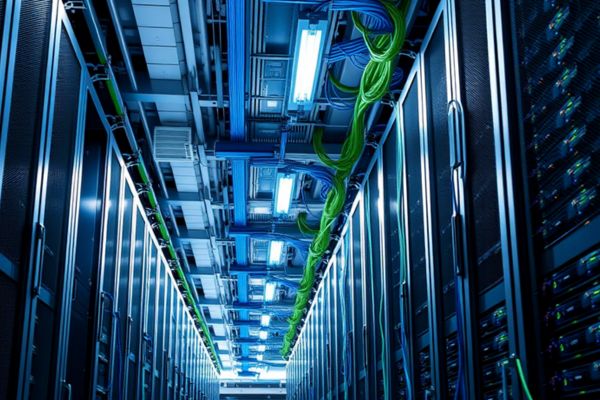The world runs on digital connections. From the moment we wake up, we are plugged into a vast network of data moving at incredible speed, powering financial systems, online learning, healthcare, and entertainment. Businesses rely on real-time analytics, AI-driven automation, and cloud infrastructure to function without disruption. But as data consumption skyrockets, the pressure on data centers is greater than ever.
Hyperconnectivity is shaping how businesses operate, how consumers interact, and how data moves across the world. Every streaming service, financial transaction, and enterprise application depends on an infrastructure that must be faster, more secure, and endlessly scalable. However, traditional data center models are struggling to keep up. This is where AI becomes indispensable. It is the key to building data centers that can support the digital economy of the future. Global enterprises are making bold moves to integrate AI into their data center strategies, recognizing its pivotal role in scaling digital infrastructure. Oracle, for instance, is expecting to invest a staggering $500 billion over five years to its Stargate project, an ambitious initiative to build AI-driven data centers powered by 64,000 Nvidia GPUs. This level of investment signals a fundamental shift, with AI reshaping the very foundation of data centers.
Let’s look at the factors that make future data centers will look like.
Ai-Driven Automation in Data Centers
Scaling a data center is not just about adding capacity. Without intelligence built into operations, expansion leads to inefficiencies, higher costs, and more complexity. AI is changing this by enabling real-time automation that optimizes how data centers function. Energy consumption, workload distribution, and system maintenance are no longer managed through static, pre-set rules. AI continuously analyzes conditions, making real-time adjustments that improve efficiency and extend infrastructure lifespan.
Cooling, for example, is one of the largest energy expenditures for data centers. AI-powered systems can predict cooling needs and regulate temperatures dynamically, reducing unnecessary power usage without compromising performance. The same intelligence applies to server workloads. Instead of overloading certain machines while others sit idle, AI distributes tasks based on demand, improving speed and reducing wear and tear.
Enhancing Security and Data Integrity
Data centers are a prime target for cyber threats, and traditional security models built around reactive measures are no longer enough. AI brings a predictive approach to cybersecurity, identifying unusual patterns before they escalate into breaches. Instead of waiting for an attack to happen, AI detects anomalies in real time, making security systems more adaptive and responsive.
The complexity of compliance is another challenge AI is helping solve. Regulations around data privacy and security are constantly evolving, and staying compliant requires continuous monitoring. AI-driven systems can track and enforce compliance measures automatically, reducing the risks associated with human error and oversight.
AI’s Role In Sustainable Data Centers
The demand for data is growing exponentially, but so is the pressure to reduce environmental impact. AI is proving to be a critical enabler of sustainable data center operations. By optimizing power usage, predicting maintenance needs, and integrating with renewable energy sources, AI is helping data centers reduce their carbon footprint while maintaining peak performance.
Cooling systems account for nearly 40% of a data center’s energy use, but AI-powered cooling solutions have been able to cut that down significantly by dynamically adjusting airflow and temperature settings. AI is also improving resource allocation, ensuring that energy-intensive processes are executed more efficiently.
India’s AI-Driven Data Center Ecosystem
India is emerging as a major player in the global data center industry, with AI at the core of its expansion. Government initiatives, rising cloud adoption, and increasing investments in AI-driven infrastructure are accelerating the country’s digital transformation. AI-powered data centers are not just supporting India’s domestic digital economy but positioning the country as a strategic hub for global data processing and storage.
AI is enabling hyperscale expansion without the inefficiencies that typically come with rapid growth. Whether through smarter energy management, enhanced security, or better workload distribution, AI is ensuring that India’s data centers are built for the future, not just for today.
The Future of Scaling Data Centers
No business runs without digital infrastructure anymore. Every transaction, every interaction, every service we rely on is powered by data centers that need to scale, adapt, and stay secure. AI is no longer a choice in this equation, it is what makes modern data centers work. Without it, businesses are operating on borrowed time, trying to stretch outdated systems in a world that moves too fast for them. The real conversation is not about whether AI belongs in data center operations. It is about who will use it well enough to build infrastructure that keeps up with what the world demands.

By Shrirang Deshpande, Country Head, Strategic Programmes, Vertiv India

















